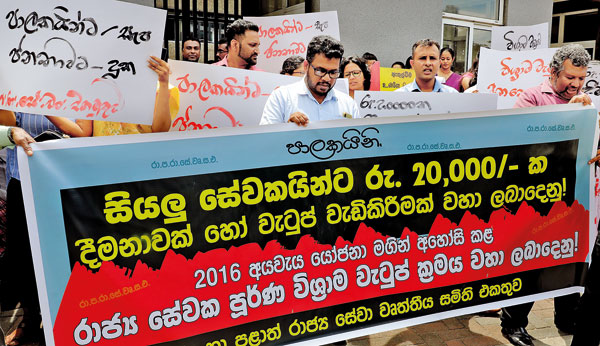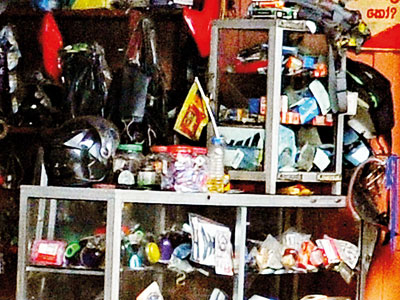News
Business sector has high expectations of digital economy in tomorrow’s budget
View(s):By Kasun Warakapitiya
Trade organisations, associations, and unions representing several sectors have come out with a string of demands with high expectations that consideration would be given to their proposals in tomorrow’s budget.
They called on the government, while taking the necessary actions, to improve the economic situation and to look into the needs and demands of the people and various sectors.

Sanjaya Ariyawansa
The Ceylon Chamber of Commerce pointed out that the business community in Sri Lanka is looking forward to the government prioritising the digitization of the economy through the upcoming budget.
Ceylon Chamber of Commerce economist Sanjaya Ariyawansa said businessmen were looking forward to the urgent establishment of the digital ID infrastructure to improve identity verification processes and boost the reach of digital banking and finance, aiming for broader financial inclusion.
“Additionally, the digital transformation of government service delivery is anticipated to make interactions with the public sector more efficient and transparent, paving the way for an effective e-government ecosystem,” he said.
He added that the private sector also hopes to see the budget introduce forward-looking climate finance strategies, emphasising the importance of robust institutional and legal structures to leverage international climate funds.
Mr. Ariyawansa said the private sector would like the budget to focus on refining the National Trade Facilitation Committee and establishing a national single window system, which are critical steps towards reducing the bureaucracy and bolstering Sri Lanka’s global trade competitiveness.
“It is also anticipated that the budget will tackle reforms in state-owned enterprises, aiming for strategic divestments and heightened transparency to improve operational efficiency and alleviate government financial burdens,’’ he said.
Meanwhile, the associations also made proposals and demands, along with expressing concerns over import restrictions, rising costs of living, and fuel prices.

Trade unions demand a Rs. 20,000 pay hike. How much will they get in tomorrow’s budget? Pix by M.A. Pushpa Kumara and Nilan Maligaspe
The Association of Container Transporters has made proposals for the forthcoming budget and urged the government and finance ministry to facilitate and amend restrictive laws. The association held a meeting on Thursday.
Nimal Amarasekare, the general secretary, said they wanted the government to offer them concessionary interest rates to import trucks and prime movers, maintain stable fuel and oil prices at least for one year, reduce the permit fee for port users, introduce training programmes for drivers and cleaners, and provide parking spaces.
Mr. Amarasena said fluctuating fuel prices are affecting small and medium businesses as their customers have agreed to a certain benchmark percentage for price revision.
He also called for improved hygiene facilities at ports.
He explained that, as trucking is one of the main small and medium-scale enterprises, the government should create an equal playing field.
N.M. K. Harischandra Padmasiri, president of the All Island Inter-District School Children’s Transport Association, told the Sunday Times that they have requested the government reduce the price of spare parts.
“The vehicle spare parts, which were earlier available for Rs 2,000, now cost over Rs 8,000, and the tyres, which were also Rs 8,000, are now Rs 25,000. Even a vehicle battery costs Rs 85,000,” he said, pointing out that a litre of diesel is Rs 356.
Mr. Padmasiri said as they are providing transport for schoolchildren and their vehicles need to be safe for students, they are also waiting until the government allows imports.
The apparel industry associations also listed out their needs and expressed their concerns over the economy. They pointed out the need for a competitive advantage in the apparel industry.
The General Secretary of the Sri Lanka Apparel Sourcing Association, Gopal K. Iyer, said that as the country is currently affected by an economic crisis, the apparel industry too is facing losses as costs of electricity, transport, and imports are adding to products while the people who are in the industry are facing the increasing cost of living.
He explained that the government needs to address these issues through the budget and needs to look into the competitive advantage of the apparel industry. Free-trade agreements are the need of the hour; India’s quota has to be increased beyond the 8 million-piece cap. Exporters and manufacturers who have invested in renewable energy and have gone off the national electricity grid should be provided with incentives.

Transport service providers complain of high spare parts prices
“The global recession has caused businesses to lose millions of dollars; therefore, Sri Lanka needs to promote itself and access new markets, and the government also needs to provide the needed support and infrastructure for the industry to develop,” he said.
The Joint Apparel Association Forum (JAAF) also made seven requests from the budget.
The requests were to allow market access to existing and new markets, a transparent cash-less refund system for SVAT (Simplified Value Added Tax), relief on the PAYE tax, a debt moratorium for the small and midsize enterprise sector, make utility costs (power and water) in line with those of competitor countries so Sri Lanka can compete effectively, liberalise shipping and logistics, and dispose of industrial waste in an environmentally sustainable manner.
The Joint Apparel Association Forum Secretary General, Yohan Lawrance, said they understand that the government was compelled to offer solid programmes on the development efforts to obtain the Extended Fund Facility from the IMF, though some of them were not popular decisions.
Keeping in mind the environment, the JAAF-submitted budget proposals are being submitted to regain the competitiveness of Sri Lanka’s apparel exports while also supporting the restoration of macroeconomic stability.
The best way to say that you found the home of your dreams is by finding it on Hitad.lk. We have listings for apartments for sale or rent in Sri Lanka, no matter what locale you're looking for! Whether you live in Colombo, Galle, Kandy, Matara, Jaffna and more - we've got them all!

